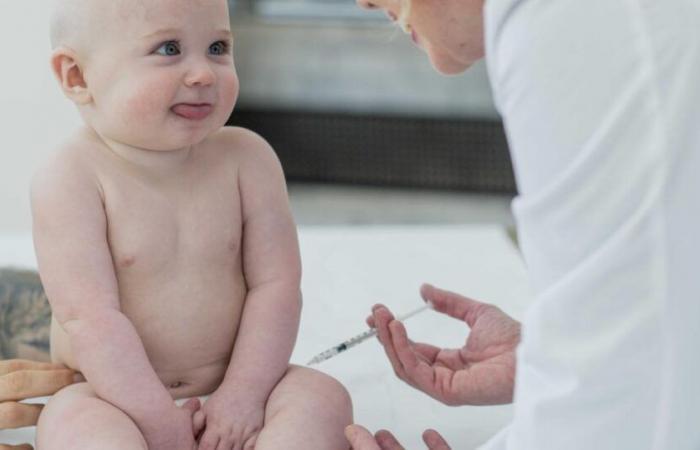In France, the number of reported measles cases increased eightfold in 2023, i.e. 117 cases compared to 15 in 2022 (1). Nothing compares to the high rates of the disease in the rest of the world, particularly in some countries in Africa, the Middle East and Asia where access to vaccination is more difficult. Still. Measles is coming back to the forefront.
“Thanks to vaccination, measles had almost disappeared in Europe until the 2000sindicates Professor Yves Gillet, head of pediatric emergencies at the woman-mother-child hospital and head of the mobile pediatric infectious disease team within the Hospices Civils de Lyon. Its strong comeback in Europe, and particularly in France, is not surprising given the decline in vaccination rates observed in recent years. Certainly, the figures are low, but all these cases are preventable, and it is unacceptable to still see people dying from an easily preventable disease in our latitudes! »
Measles, a highly contagious disease with non-specific symptoms
Extreme fatigue, cough, high fever, runny nose, red and watery eyes… These are the symptoms of measles. They usually appear 10 to 14 days after exposure to the virus. ” But these symptoms of a flu condition can also be those of a multitude of other illnessesexplains Professor Gillet. The problem with measles is that once contracted, it most often begins with a bad cold during which we are very contagious, even though we do not yet know that it is measles. ! “.
In fact, the rash appears only a few days after the first symptoms of the disease. It manifests itself by small, very red spots that first appear on the face then gradually spread over the entire body. Unlike chickenpox, measles spots do not itch. This rash lasts about a week.
“The diagnosis of measles must be confirmed using a PCR test (as for Covid or whooping cough),” insists Professor Yves Gillet.
A non-benign disease that does not only affect children
The disease is caused by a very resistant virus (paramyxovirus of the morbillivirus genus) which circulates between humans. Contrary to popular belief, measles is not a benign disease. It is true that, in the majority of cases, it heals spontaneously within a few days. “But it remains very difficult to predict its evolution,” underlines Professor Yves Gillet. It can also lead, at any age, to serious complications such as pulmonary (pneumonia), ocular, neurological (encephalitis) damage ».
The people most at risk are, of course, infants under one year old (before they are vaccinated) and immunocompromised people. In pregnant women, it can cause miscarriage, fetal anomalies, neonatal measles, etc. But it can also have consequences on people who appear strong, athletic and in perfect health without us really knowing why.
“In France, nearly 30,000 cases of measles were recorded between 2009 and 2020,” explains Professor Yves Gillet. We don’t talk about it much, but 26 people still died. In 1 in 1000 cases, measles causes brain damage that can be fatal. »
How is measles transmitted? ?
“Measles is one of the most contagious infectious diseases,” says Professor Yves Gillet. In the absence of vaccination protection, there is an extremely high risk of catching it by coming into contact with a person who has it, knowing thata sick person can infect up to 18 to 20 people. It is transmitted mainly by respiratory route with small and large droplets of contaminated saliva which remain in aerosol and suspended in the air for a very long time. »
This contamination can occur when coughing, sneezing, blowing your nose, but also by soiled hands, objects or toys passing from child to child, hugs or connections with infected people. The patient is contagious 5 days before the rash begins (maximum contagion phase) then up to five days after the start of the rash. Even more annoying for those around him, he is also contagious even when he feels well (before the first symptoms of flu). Hence the significant risk of coming into contact with a contagious person without even knowing it…
Relieve symptoms if left untreated
There is no specific treatment for measles. Once the diagnosis is established, management consists of relieving symptoms, particularly fever, and preventing complications. Because measles also causes lasting general fatigue, favoring infections in the months following the illness due to a temporary drop in immunity.
“The only way to protect yourself is immunity,” insists Professor Gillet. Either because you have already contracted measles, or through the vaccine. » In fact, just like chickenpox, a person who has contracted it is then immune to it for life.
Vaccination to avoid catching it and avoiding transmitting it
Vaccination is better protection against measles. Effective and well tolerated, it has few contraindications, except in cases of pregnancy, medications weakening the immune system or in the presence of an allergy to one of the components of the vaccine.
Since January 1, 2018, vaccination has become compulsory for children under 2 years old. The trivalent MMR vaccine (measles, mumps, rubella) is 100% reimbursed for children up to 17 years old. The first dose of vaccine is recommended at the age of 12 months. The second dose should be administered between 16 and 18 months of age. In an opinion delivered on May 24, 2024, the High Authority of Health (HAS) issued a new recommendation. She recommends two doses of vaccine, instead of a single dose, for any unvaccinated person born after 1980.
“We must take a model from the countries of Northern Europe which no longer see practically any cases of measles and continue to extend vaccination coverage,” concludes Professor Gillet. Especially since numerous studies also demonstrate that the effects of the measles vaccine allow a reduction in all respiratory infections in children and a reduction in infectious mortality linked to other diseases. »
(1) Public Health France.






